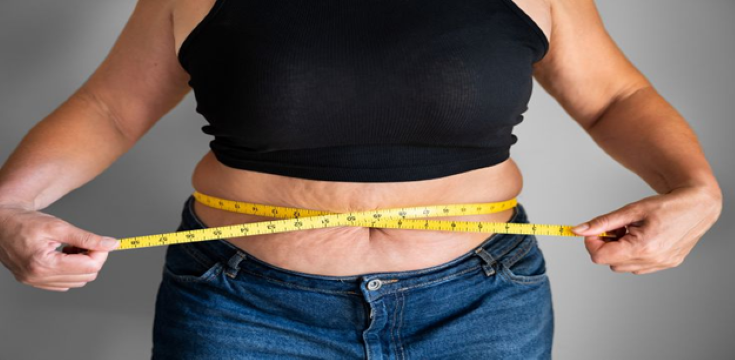Hormonal changes that come with age can make it easier to gain weight, especially around your midsection. While it might feel like weight gain is inevitable once you hit your 40s, the truth is: it doesn’t have to be. As estrogen levels decline and metabolism slows during menopause, your body may respond in frustrating ways, like stubborn belly fat that just won’t budge.
And while hot flashes, night sweats, and mood swings are common symptoms of this transition, a growing waistline doesn’t have to be part of the package. Yes, hormonal shifts can make weight loss more challenging, but not impossible. And that extra belly fat? It’s not just a nuisance; it can also pose serious health risks.
Exercise More Often, More Intensely to Counter Midlife Weight Gain
Start with a mix of moderate and vigorous exercise to burn off menopausal weight gain. Your routine should include aerobic exercises like swimming, walking, bicycling, and running, as well as resistance or strength training.
Bear in mind that exercise intensity is personal. So, someone who hasn’t exercised in years may need very little exercise for it to feel intense, while someone in great shape really needs to push it. When in doubt, and to avoid injury, find a personal trainer or physical therapist to help guide your routines.
It’s Better to Stand Than Sit, if and When You Can
The formula is simple: The longer your body’s in motion, the more calories your body will burn. One low-effort way to do that? Stay as vertical as possible throughout the day. Not only will that increase calorie burn, but it can also help prevent other health problems. Staying vertical isn’t the same as breaking out a full-on sweat (although it’s great when you can do that too).
To stay upright and moving more often, stand and pace when you’re on the phone; go upstairs to chat with a family member instead of texting them; or park further from the front door of the places you’re going, so you’ll get more steps in. And if your job has you sitting in front of a computer all day, try a standing desk along with taking breaks to move around.
Watch Your Carbohydrate Intake
Not all nutrients are created equal, and some experts believe that a steady diet heavy in processed or refined carbs like pasta and bread is a significant factor for excess belly fat. Carbs are the enemy of the middle-aged woman, and if you are perimenopausal, look at how much sugar you are eating. Carbs turn into sugar in our bodies. Some turn faster, like candy bars, oatmeal burns slower, but eventually it all turns to sugar. If you are aware of how many carbs you are eating, you are going to do better.
Shrink Belly Fat With Tai Chi
Maybe you’ve never tried it, or perhaps you’ve seen a group of people practicing tai chi together in a public park, but research out of Hong Kong showed that this Chinese discipline of low-impact meditative movements linked with breathing could help trim waistlines in middle-aged and older adults.
Keep Portions in Check and Consider Your Eating Patterns
Your metabolism has slowed down by the time you hit menopause, with some research suggesting it burns a couple of hundred fewer calories a day. Extra weight can very quickly add up if you don’t reduce the number of calories you consume. It’s also this time in your life when you may be easing up from the daily duties of preparing meals for your family, and you’re delighted to take a break from the kitchen.
Research is pointing to doing better in the weight department by eating three square meals a day. Start your day with a hearty breakfast that contains lean protein, and finish the day with a light supper. Eating your main meal at noon can be beneficial for your weight.
Choose Fats Wisely and Eat Meals With Healthy Fats to Counter Weight Gain
Fat adds flavor, makes our food taste better, and is part of a healthy diet. So the good news is that it isn’t necessary or recommended to eliminate it from your diet altogether. You just need to learn how to be more choosy.
The healthiest fats are the ones that derive from plant sources like olives and nuts, but keep in mind that healthy fats like those found in avocados have the same number of calories as the fat found in a hot fudge sundae.
Time Meals and Snack Right to Counter Mindless Eating
When you are following a midlife diet, it’s not just what you eat that matters, but also when you eat. Midnight ice cream binges and potato chip raids, for example, are generally bad ideas and would be a poor choice even in the light of day. But the general message on food timing is clear: “Don’t eat too much too late. Eating later in the evening is murder for trying to keep weight off.
Another way to keep snacking calories in check is to avoid mindlessly nibbling in the afternoon. What a menopausal woman does from 3 p.m. on every day can determine how big her belly is. That’s when most women tend to overeat and oversnack.
To help rein in your snacking, eat during a window of 8 to 12 hours a day, and then don’t eat for the rest of the time. Experts find this imperative to take care of weight at any age, but especially during menopause. End your eating at a reasonable time, like 7 p.m., and pick it up again 12 hours later, the next morning at 7 a.m
Vary Your Workouts and Try New Activities
It’s easy to get into an exercise rut, and even easier to fall out of the habit of exercising at all. But at this stage of your life, not getting your move on is not an option. Ideally, to keep your weight in check, you’ll be working out three or four times a week. It’s extremely effective at keeping excess body levels of fat down, and make sure to get in some weight training, even if it’s just using your own body weight.
Any kind of physical activity is better than none at all, but if your body gets too accustomed to a routine, it won’t burn belly fat as efficiently as when you first started doing it. If you’re doing the same workouts you’ve always done and are expecting the same results, that isn’t going to happen.
Update Your Healthy Sleep Strategies to Rest Better and Fight Weight Gain
Insomnia is an extremely common symptom of perimenopause, and that transition phase can last for four to eight years. All that time spent waking up unrefreshed means you’re probably feeling too exhausted to head out for a workout, too. It’s imperative to get sleep as you get older.
Inadequate sleep also impacts our hunger hormones, ghrelin and leptin. “Ghrelin and leptin become dysfunctional when you don’t get enough sleep, so good luck trying to lose weight if you don’t fix that problem.
Aim for a minimum of seven (and ideally eight) hours of shut-eye, although this varies from person to person and over time. Keep your bedroom cool to offset hot flashes and night sweats, and turn off all glowing screens for at least an hour before you want to fall asleep.
Find a Friend or a Group to Exercise With
To attack belly fat and any other menopausal weight gain, you’ll need to burn between 400 and 500 calories most days of the week from cardiovascular exercise, such as walking briskly, jogging, bicycling, dancing, or swimming. Find a friend who needs to exercise as much as you do, and set a date to work out together.
Adjust Your Coping Strategies and Address Your Stress Levels to Help Reduce Weight GainIf your fat is making you feel stressed or vice versa, for that matter, don’t disregard that link. If you walk around completely stressed all the time, your cortisol levels will increase, and that will make it easy for you to deposit fat deep inside the belly.
Cortisol, known as the stress hormone, stimulates the liver to increase production and release of blood sugar and helps the body convert fats, proteins, and carbohydrates into usable energy. As part of the body’s “fight or flight” response, cortisol is released during stressful times to give your body a natural energy boost, but when cortisol levels are constantly high because of chronic stress, these same effects may result in insulin resistance and type 2 diabetes.
Talk With Your Doctor About How to Minimize Weight Gain and Other Menopausal Symptoms.
If your lack of estrogen is contributing to typical menopausal symptoms, such as severe hot flashes and night sweats, and the symptoms (despite trying nonmedication approaches) are severe enough to impact your quality of life. Complementary therapies such as acupuncture may help, too. Your doctor will likely want to investigate whether your weight gain is indeed from menopause and not from some other health condition that needs treating as well.




